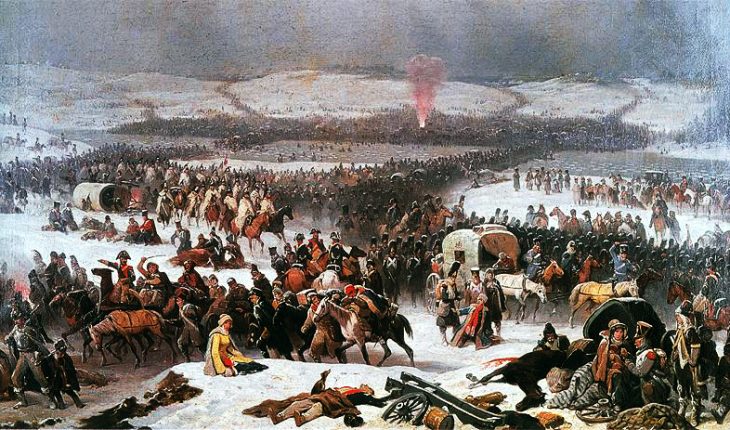According to historical evidence, Napoleon Bonaparte didn’t fail his famous campaign to Russia because of harsh winter, but only because of his own tactical errors. His famous apology for this military disaster (“It is the winter that killed us. We were the victims of the climate ”) was only an attempt to hide his own failure.

Napoleon crossing the Alps(Jacques Louis David, 1800)
During the first half of his campaign to Russia, while Napoleon’s armies marched towards the Moscow, the weather was relatively warm, definitely above the average. Historical weather reports tell us, that in October 1812, at the beginning of the invasion, average temperatures in Kiev and in Warsaw were around 10 °C, in Talinn and Riga 7 °C. Even at the end of November, during the well-known crossing of the Berezina River(which was frozen at the time according to Napoleon), temperatures were still above the freezing point of water.
Well-known paintings, which depict the freezing battalions of Napoleon’s soldiers marching across snowed Russian plains, have little to do with actual November 1812.

Napoleon’s army crossing the Berezina river(January Suchodolski, 1866)
In his 29.th bulletin, written on the 3.rd of December 1812, Napoleon states: ”The cold, which began on the 7th of November, suddenly increased; and on the November 14th, 15th, and 16th, the thermometer was showing eighteen degrees below the freezing point. The roads were completely covered with ice; the cavalry, artillery, and baggage horses perished every night, not by hundreds, but by tens of thousands.”. Although the winter of 1812 was not a mild one when compared to others, average temperatures didn’t drop below zero before the last days of November.
In reality, the size of Napoleon’s Great Army, initially more than 380,000 men, already decreased to a mere 135,000 at the beginning of September 1812, after the first eight weeks of his campaign to Russia.

Battle of Berezina(Peter von Hess, 1844)
Napoleon’s losses on the way back should be principally attributed to the scorched earth strategy of the Russian army, not to the cold winter weather. After the remnants of his ”Great Army” left Moscow, they had prepared food stocks only for seven days. Not harsh winter, but hunger, diseases, desertions, and casualties suffered in other minor battles caused the majority of Napoleon’s losses during his invasion to Russia.




